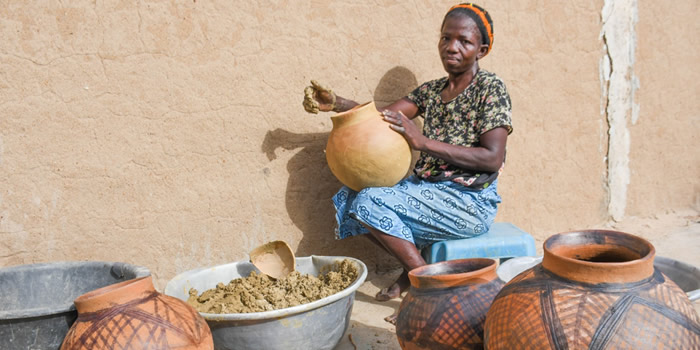Adverts
GENERAL
World Vision FMNR resuscitates pottery among women in Amutanga
Traditional pottery craft that took a nosedive some years ago in Amutanga in the Kassena-Nankana West District of the Upper East Region has been resuscitated by World Vision Ghana's Farmer-Managed Natural Regeneration (FMNR).

Date Created : 5/3/2023 12:00:00 AM : Story Author : Ghanadistricts.com
Potters, mostly women, rely on wood logs and dry grass to bake their products into finished goods for sale. "At some point, life became difficult because we were idle.
“Now there are branches of trees, shrubs, and grasses, and I don’t need to trek long distances to harvest firewood and grasses for my pottery products”, Asaah Awinpoaga, a Potter said.
The 57-year-old said the intervention of FMNR had reduced poverty and inequality among women who can now fend for themselves independently.
She said a decade of uncontrolled bushfires, grazing, and indiscriminate tree felling, and unsustainable farming practices led to depleted forest and vegetation cover, depriving pottery artisans of a reliable source of income and livelihood.
“With funding support from a private donor through World Vision Germany, World Vision Ghana addressed unsustainable natural resource exploitation in the Amutanga community through the FMNR for Seed Project. The FMNR site helps shrubs, grasses, and trees grow, provide a sustainable wood fuel source, and helps artisans revive pottery. This has allowed traditional potters to keep their craft alive and make a living from it.
“This is how the project helped the community to overcome decades of uncontrolled bushfires, grazing, indiscriminate tree felling, and unsustainable farming practices. It subsequently led to the restoration of depleted forest and vegetation cover," Mr Samuel Abasiba, FMNR4Seed Project Manager at World Vision Ghana said.
He said Since then, things had changed for these potters as hundreds of farmers adopted and integrated FMNR principles into their farming practices with improved environmental agility, increased soil fertility and yield, built farmers’ resilience, and increased household food security.
"The forest regrowth means a revived pottery business and improved income and livelihood,” added Awinpoaga. They can support their children’s financial, educational, and health needs since they revived the pottery business.
Madam Awinpaoga is one of the 8,000 beneficiaries of the FMNR 4 Seeds Project being implemented in 35 communities in the Kassena Nankana West District of the Upper East Region of Ghana.
Its goal is to improve and sustain food security and resilience among farmers in the area by 2025 and it uses systematic approaches that integrate different but complementary activities to ensure sustained household food security and economically empower households.
One such approach is FMNR, an agroforestry methodology that integrates crop production with tree growth through shrub and tree stump pruning.
It contributes to restoring degraded landscapes, increasing tree populations, reducing water and wind erosion of soil, improving soil nutrients, and improving moisture retention.


 facebook
facebook X (twitter)
X (twitter) Youtube
Youtube +233 593 831 280
+233 593 831 280 0800 430 430
0800 430 430 GPS: GE-231-4383
GPS: GE-231-4383 info@ghanadistricts.com
info@ghanadistricts.com Box GP1044, Accra, Ghana
Box GP1044, Accra, Ghana